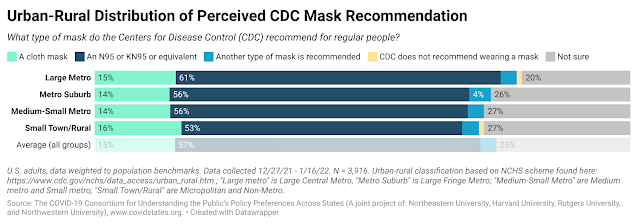Rural Americans are less likely than urban and suburban Americans to wear any kind of mask, less likely to understand what type of mask offers the most protection against coronavirus infection, and less likely to know what type of mask the Centers for Disease Control and Prevention recommends, according to exclusive Covid States Project data provided to The Rural Blog.
The findings reflect rural Americans' overall more skeptical attitude about the pandemic and underscore the need for more public education about masking and other preventative measures (though lack of trust in the news media can make that more difficult).
Researchers surveyed over 17,000 individuals nationwide about their mask usage between Dec. 27, 2021 and Jan. 10, 2022. When asked what type of mask they wear, rural Americans—like all other population groups—were most likely to wear a cloth mask or other fabric barrier. But rural Americans were more than four times as likely as city dwellers to wear no mask at all.
 |
| Covid States Project charts here and below; click the image to enlarge it |
Though 63% of rural Americans knew that N95 of equivalent masks offer more protection than cloth masks, that was the lowest percentage of any population group. Rural Americans were the most likely (29%) to be unsure about whether cloth masks or N95 masks offer more protection.
Rural Americans were the least likely (53%) to know that the CDC recommends an N95-type mask, but the most likely (16%) to believe the CDC recommends cloth masks and the most likely to be unsure of which type is recommended.


No comments:
Post a Comment